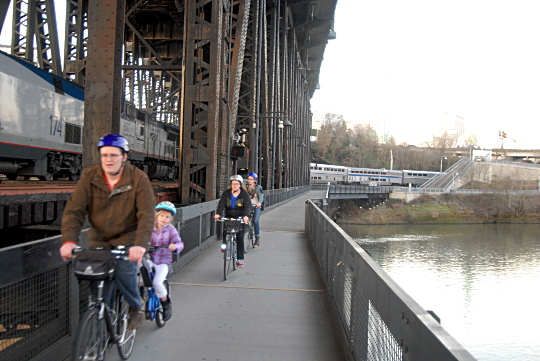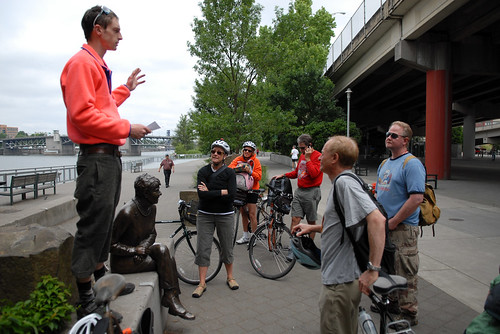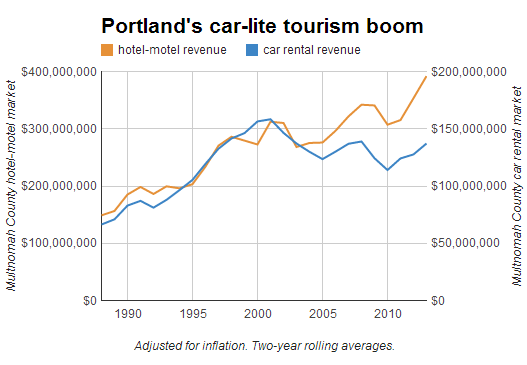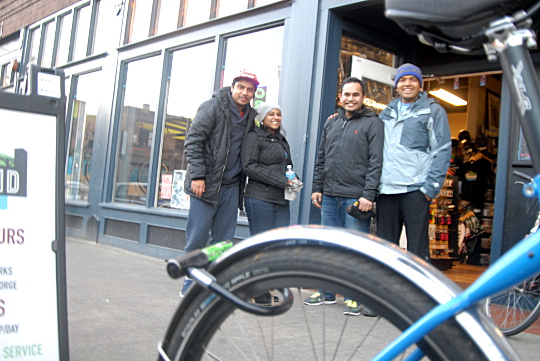
(Photos by M.Andersen and J.Maus/BikePortland)
Tourism to Portland is soaring. But who is coming here, and why?
County tax records offer a clue to part of the picture: Even as Portland has become a more popular destination for travelers, the records show, spending at local auto rental services has dropped.
Aggregate revenue at Multnomah County’s hotels and motels is up 26 percent since 2001, after adjusting for inflation. Real car rental revenue, meanwhile, has fallen 13 percent.
Some of the change is likely due to Portland’s rising status as a regional destination: visitors from Missoula or Seattle are likely to simply drive their own cars to town. But the size of the shift also suggests that Portland’s tourism boom is being driven in part by people who don’t expect to use a car at all while they’re here, said Megan Conway, vice president for communications at Travel Portland, the city’s hotel-funded tourism bureau.
“You can come and get around on the MAX, or your hotel might have a free bike that you can use,” Conway said. “That’s definitely appealing to the people who come here.”
Travel Portland’s “Portland is Happening Now” campaign recently placed collage-style ads in Seattle newspapers that featured three bicycles, a trike, a bus, an Amtrak engine, a streetcar, a light rail car, an airplane, a skateboard and a unicycle, but no automobiles.
Sitting in the lobby of the Ace Hotel with a friend last month, Paul Day said he’d decided against renting a car for his visit.
“I got in today from San Francisco and I took the light rail; I went to Pok Pok and I took the bus back,” he said. “It’s been 10 years since I’ve been here, and I remembered how easy it was to get around.”
The previously unreported numbers are calculated from Multnomah County hotel-motel and car rental tax income and rates, provided by county spokesman Mike Pullen. Changing costs in the auto and hotel market might also play a part — but nationally, real auto rental revenue is unchanged since 2001 while the lodging industry has grown only 13 percent.
“Active vacationing is something that I didn’t really experience as a kid. It’s not just riding around in a car going from restaurant to restaurant.”
— Scott Klees, Pedal Bike Tours
In other words, the whole country is downshifting its car rental spending per lodging dollar. But in the Portland area, this seems to be happening at least twice as fast.
In Multnomah County, the split between lodging and auto rental demand seems to have begun in 2003 — two years after the Red Line connected to the Portland Airport, two years after Bicycling Magazine first named it the country’s best bike city, three years after Amtrak Cascades added a fourth daily train between Seattle and Portland and seven years before the debut of Portlandia on IFC.
“People are realizing, ‘I want to raise my kids with an active lifestyle,’ so people will take a Portland-style vacation: hiking, biking,” said Evan Ross, owner of Cycle Portland in Old Town.
Ross said he’d launched the city’s first bike tour and rental service after returning from a 2007 trip to Europe and getting a hunch that the same thing could work in Portland.
“I got back and I was like, why is nobody doing this?” Ross said.
A few blocks away at Pedal Bike Tours, manager Scott Klees told a similar story.
“There are a lot of people who are here just to do things by bike,” Klees said. “Active vacationing is something that I didn’t really experience as a kid. It’s not just riding around in a car going from restaurant to restaurant.”
One of Ross’s customers, Nisarg Shah, said he was relying in part on hitching car rides with a friend while visiting from California, but that he and his friends were deliberately using public transportation and biking while in Portland.
“When you go to Wikipedia, the first thing you see is that the public transit is very good,” said Shah, 27. “We wanted to explore Portland either by Segway or by bicycle. You can stop anywhere that you want. In a car you can’t.”
Is this trend related to the much-discussed economic impact of bike tourism on the region? Probably not a lot of it. Even the estimated $400 million impact of bike-related tourism is just 4 percent of total Oregon tourist spending, and many of the dollars measured by the Travel Oregon study are actually Portlanders and other Oregonians traveling more than 50 miles from home for bike-related daytrips or overnights — a valuable decision for their destination, but not likely to involve a car rental in any case.

Instead, the shift is more likely due to the collective decisions of hundreds of thousands of visitors like Day and Shah — people who for many reasons found Portland an attractive destination, but didn’t see the need to rent a car during their visit.
Conway, the Travel Portland executive, said Portland’s identity as a low-car city is part of the national brand that seems to be bringing it such success, along with its reputations for food, drink and fashion design.
“It’s something that we hear people refer to, that the city has a very European feel,” she said.
Whatever Portland has been up to, it seems to be working, at least where tourism is concerned.
“We are on trend if not above trend for what the country is seeing,” Conway said. “That kind of growth is amazing from an economic impact standpoint.”


